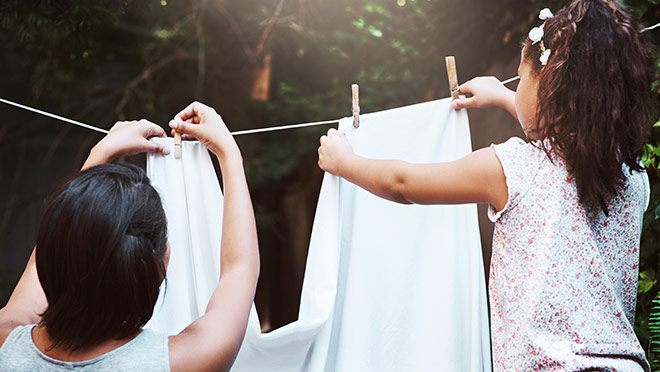Energy-saving checklist for the dawn of summer

Do a heat check, hang-dry laundry and be smart with cooling
A few years back, a BC Hydro customer reported that his electricity bills in late spring were way up from the years before. After a chat with BC Hydro, he checked the baseboard heaters in all his rooms and discovered a baseboard in a seldom-used room was still cranked up. It was June.
If you're a Team Power Smart member or a regular reader of the Connected newsletter, it's unlikely you've made that same mistake. But it's easy to forget to turn things off, and when it comes to energy use, it all counts. So here's a quick checklist that includes smart ways to use electricity now that we're on the cusp of summer in B.C.
Make sure the heat's off in every room, and check those fireplaces, too
By now, you probably don't need any more heat in your home. Check your thermostats throughout the home to ensure that you've either turned off the heat or set the temperature at the proper seasonal setting. And if you have an electric or gas fireplace, check that it's not running, too.
Got a heat pump? Check the filters, and consider turning it off
If your home is cool enough that it doesn't require air conditioning, simply shut off your heat pump. Try other ways to keep your home cool, such as closing window blinds and curtains in the mornings and afternoons to keep the cool air in.
Also, check that your heat pump filter isn't dirty, as cooling requires more airflow than heating. Clean any visible dust and dirt from the air returns at the top of your indoor head.
Once you feel you need air conditioning, first try switching your heat pump to "circulate only", which moves cool air from a basement to other warmer areas of the home.
If you can, use fans instead of air conditioning
A 2018 BC Hydro report on air conditioning showed that running a central air conditioner for nine hours a day can cost British Columbians around $300 in electricity costs over the summer, compared to just $6 to run a fan for the same amount of time. Adding to costs was the fact that more than 40% of British Columbians always or sometimes leave the A/C running when they're not at home.
If you're using a floor or ceiling fan to stay cool in your home, turn them off when no one's in the room. They don't actually cool rooms, but the moving air on your skin makes you feel cool.
Avoid using the clothes dryer
If you have a clothesline or a drying rack you can move to the deck or yard, make it your go-to method of drying clothes in the summer. Not only will it save you money – if you do eight loads of laundry a week and use your clothesline for 50% of those clothes, you could save $65 a year – it will cut down on heat generated by the dryer inside your home.
Be strategic with air flow and window coverings
Promote air flow through your home after it cools down in the evening and you can open windows again, but keep windows and doors closed during the heat of the day. As soon as the sun starts hitting your home in the morning, and then through the afternoon, use window coverings to block it as much as possible.
Cool your kitchen with small appliances (and more salads)
Using your oven or stovetop on a hot day can erase any cooling gains you've made in the home. Use a toaster oven, microwave or Instant Pot if you can, and read our story on keeping your kitchen cool for fun recipes and other ideas for the summer.
When it's really hot, consider using the barbecue or leaning heavily on salads. Get creative to keep your cool.
Related content:
- Hydro hacks: Low-cost ways to beat the heat
- Tips for using your heat pump